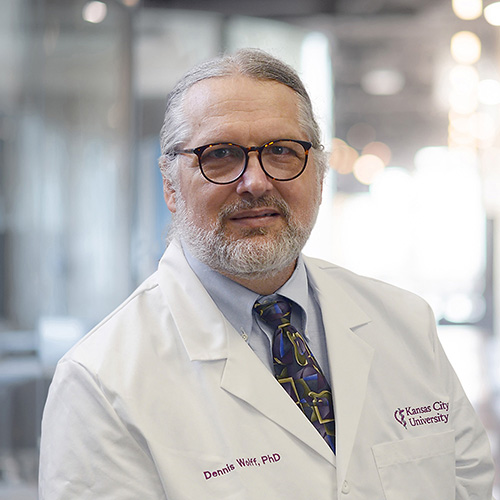
Dennis Wolff, PhD
Associate Professor of Pharmacology – Joplin
Dr. Wolff is a classical pharmacologist with the background knowledge and technical skillset for beginning with in vivo and ex vivo studies of rat and mouse models of human disease and then drilling down to understand the underlying molecular mechanisms. He is skilled in general lab problem-solving including equipment repair and custom computer programming, data analysis and graphic presentation, data interpretation and scientific writing. His current principal research interest is understanding how individual cells can alter, especially via intracellular modulators such as RGS proteins and microRNAs, the duration and even the qualitative nature of their response to the same level of extracellular hormones acting through G-protein coupled receptors.
Most of Dr. Wolff’s recent research publications are via collaborative work in the labs of others in which a team approach permitted studies that incorporate biochemistry, molecular biology, cell culture, in vivo/ex vivo studies, histology/immunocytochemistry and, when possible, confirmation of findings in human tissue specimens. From this, he has research publications in several areas including asthma, pulmonary fibrosis, and breast and prostate cancer. If research space for laboratory animals becomes accessible to him, he would pull equipment from storage to apply similar research methods and strategies while revisiting his much earlier research focus on a multifactorial structure/function assessment of renal and extra-renal vascular changes during the etiology of hypertension.
Dr. Wolff had been primarily assisting KCU students and their collaborators on their project initiatives but, with some intramural funding, he is now working with students to test his novel hypothesis on the etiology of postural orthostatic tachycardia syndrome (POTS). Dr. Wolff also has a longstanding curiosity about a possible role for smell and taste receptors expressed by many cancer cells as they migrate and invade in response to chemotactic gradients. To explore this, he has recently designed and printed in 3D untested chemotaxis chambers for exposure of cancer cells in a common well to parallel chemotactic gradients, and designed and built portable microenvironment chambers in which to follow cultured cell movement over time with a webcam microscope. These resources will hopefully enable several groups of students to conduct novel cancer cell chemotaxis experiments in parallel.
Dr. Wolff also envisions using adaptations of those same resources to explore innovative research questions related to the oral microbiome. Other initiatives are also underway including working with KCU students as they engage with RaiseCommunity.org, a local Refugee And Immigrant Services and Education group that helps newly placed refugees become self-sufficient in the Joplin, Missouri, area. Dr. Wolff also has an enduring interest in improving student learning and has created a variety of unique online teaching aids and animations with which student collaborators might contribute to the medical education literature.
Additional information about Dr. Wolff's research activities and publications can be found at these hyperlinked web sites: ORCID | Google Scholar | ResearchGate Profile